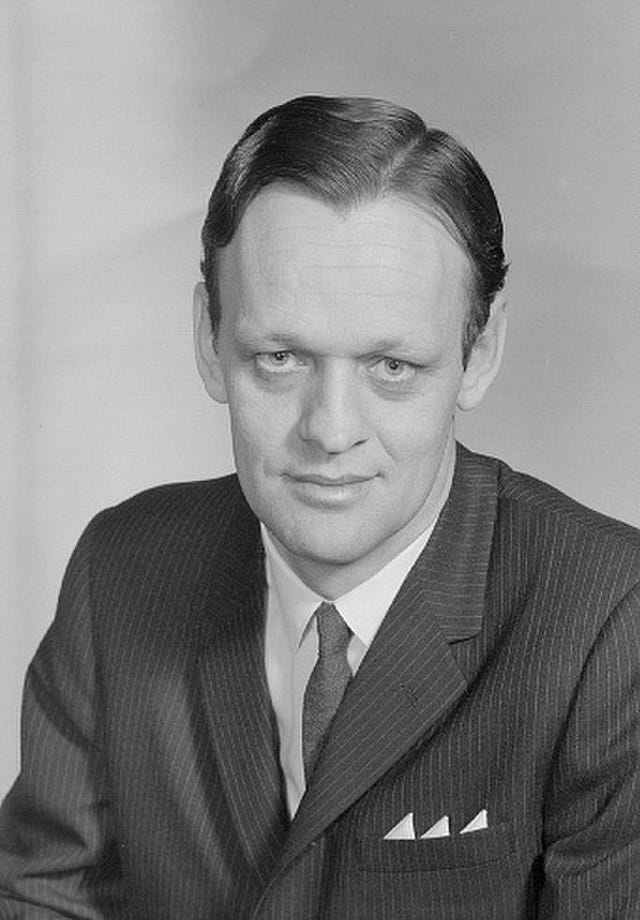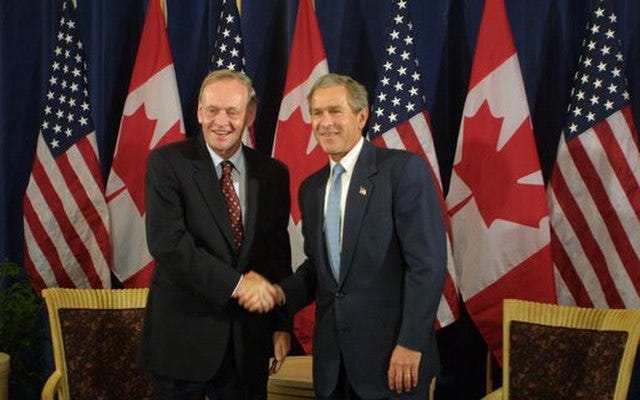Jean Chrétien thinks you're an idiot
The former PM claims he had no idea what was going on at residential schools when he was Indian Affairs Minister, despite overwhelming evidence to the contrary
Earlier this week, former prime minister Jean Chrétien told Radio-Canada that he was never told what occurred at residential schools when he was minister of Indian Affairs and Northern Development from 1968-1974 in Pierre Elliot Trudeau’s government.
“The problem was never mentioned when I was minister,” he claimed. “Never.”
As reported by the CBC, the ministry received at least four complaints of abuse at the notorious St. Anne’s Indian Residential School on the Fort Albany First Nation in northern Ontario— as well as two complaints from a school just 130 km north of Chrétien’s own hometown of Shawinigan, Que.
Chrétien’s claim is wildly implausible, since conditions in residential schools began to come under widespread critical scrutiny in the late 1960s, with the government taking over operations of many schools from the Catholic Church beginning in 1969.

"It's a terrible, terrible thing, when you get that old, you are still consumed in all those lies and there is no shame at all in what you've done to other people in the country," Mike Cachagee, a member of the Chapleau Cree First Nation who attended three residential schools in northern Ontario, told the CBC.
"It's sad. It just shows you that whole aspect of colonialism and how entrenched it is."
One letter, obtained by NDP MP Charlie Angus through an Access to Information request, was written directly to Chrétien from a teacher at St. Anne’s concerned about conditions there. It was dated Dec. 28, 1968.
The CBC compiled several complaints the ministry received from Chrétien’s time as minister that are worth excerpting at length:
In 1971, federal officials received reports that a student claimed they had been "mistreated and discriminated against" by a teacher, and another student claimed they had been kicked by a staff member, according to an entry in the school narrative for the St. Anne's institution, which is posted on the website of the National Centre for Truth and Reconciliation (NCTR).
School narratives outline the basic history of an institution and are primarily based on federal government records. The narratives, compiled by Ottawa, were a key document used in residential school compensation cases.
That same year, a federal government employee reported that another St. Anne's teacher kept weapons and ammunition in class to scare students, according to the narrative. That same teacher faced allegations of beating one student and kicking another, the narrative said.
In 1973, a separate St, Anne's staff member was "reprimanded for offering alcohol to a minor" staying at the school residence and convincing her to drink it, according to the narrative.
The next year, the school principal wrote the Indian agent in Moose Factory, Ont., that the parents and an unnamed First Nation band chief planned to press charges against another teacher at St. Anne's for kicking a child in the face during a physical education class….
At the Anglican-run La Tuque residential school, which sat just north of Chrétien's hometown, the federal government launched an inquiry in 1971 into allegations that a former employee "mistreated children, including cutting students' hair as punishment for disobedience," according to the institution's narrative, posted by the NCTR.
A year earlier, an employee was suspended and "discharged" from the institution after four former students went to local police in La Tuque, Que., with allegations they were sexually abused, according to the narrative, which cites several government records.
The narrative does not recount what happened with the complaints.
In 1973, federal officials received reports that a grandparent of two students attending Catholic-run Lebret residential school in Saskatchewan claimed that a supervisor "broke a girl's arm and then laughed" and that two to three supervisors "were cruel towards pupils," according to the narrative.
In a separate but nevertheless stunning bit of historical revisionism and insensitivity, Chrétien compared his experience as a teenager in boarding school to children being kidnapped from their families and forced to attend residential schools.
“I ate baked beans and oatmeal. And to be sure, it was hard living in a boarding school, extremely hard. Here in Quebec, we had to [in order to get into university],” he said in a Radio-Canada interview.
Historian David Webster posted excerpts from Lawrence Martin’s 1995 biography of Chrétien on Twitter, in which Chrétien argues that Indigenous peoples should be treated no differently than francophone Canadians, ridiculing the notion of cultural genocide.
“[T]hey didn’t want to be equal. They wanted to have special status,” Chrétien said of Indigenous peoples. “We don’t have reserves for francophones. We don’t have a department of francophones … A francophone under the law has the same rights as others.”
There’s no denying Chrétien knew what was going on at residential schools when he was in a position to put a stop to it. The question is why he would be so brazenly deluded about it.
Edited by Joel Laforest
In other news …
Former Canadian reservist sentenced to nine years in prison for role in neo-Nazi terror plot
Patrik Mathews, a former combat engineer with the Canadian Forces, fled Canada after his ties to the neo-Nazi organization The Base were exposed in August 2019.
Matthews and his co-defendant, Brian Lemley Jr., who housed Matthews after he fled Canada, pled guilty in June to three charges related to possessing a machine gun and destroying a cell phone that was part of the FBI investigation against them.
From Vice: Together the two plotted how they could further accelerate the fall of society to kick off a race war. During this time Mathews attended The Base meetups where he used his military training to lead the group through several paramilitary exercises.
Toronto’s mayor is moonlighting as a special advisor to Rogers
John Tory has been earning $100,000 annually — more than half his mayoral salary — in his side-hustle as a special advisor to the Rogers family, which owns the eponymous telecommunications company and is embroiled in a bitter family dispute.
In 2010, Tory was appointed to Rogers Communications’ board of directors, which he resigned from when he was elected mayor but stayed on as an advisor to the family trust, which elects board members.
Via the Toronto Star: To city hall watchers, Tory’s relationship with Rogers has been at issue since he was first elected in 2014, when he sought legal advice about his role with the company. For the last couple of years, Tory has declared more conflicts of interest than any other city council member, half being related to Rogers.
Tory spokesperson and former Toronto Sun city hall reporter Don Peat called Tory’s role with Rogers a “moral obligation to his late friend, Ted Rogers.”
If you like this content, feel free to share, subscribe and tell your friends:





